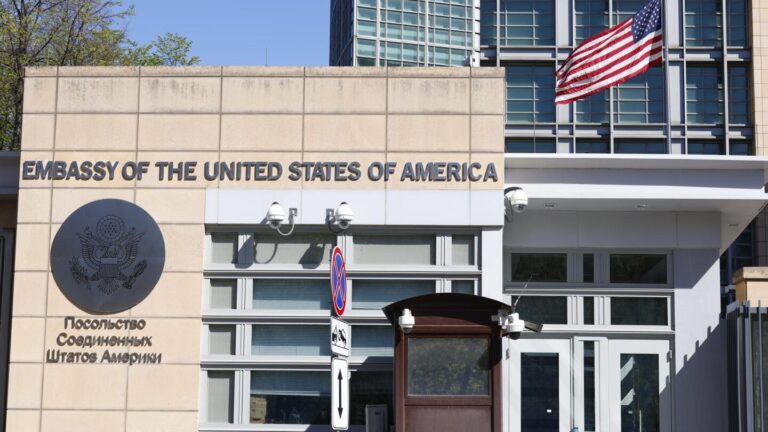MOSCOW (AP) — Kremlin orders have forced the U.S. Embassy to stop hiring Russians, cut its consular staff by 75% and restrict many services.
The order, which took effect on Wednesday, has taken rapidly deteriorating U.S.-Russia relations to a deeply personal level.
The cuts have left the embassy with only very limited services, including reviewing “life-or-death” visa applications. As a result, Russian businessmen, exchange students and romantic partners are left in limbo, unable to obtain visas. Even Americans are unable to register their newborns or renew their passports.
This is a major blow to Anastasia Kuznetsova, 20, who is engaged to a Californian, and who had already spent nearly two years trying to get a visa for her fiancé. Obtaining a U.S. visa for Russians is a highly cumbersome process that was already being delayed by COVID-19.
“I felt devastated and much more depressed than I had been before,” said Kuznetsova, who last saw her fiancé in January during a trip to Mexico. “I have no idea how long my job will last or if I’ll see him for all these years.”
Thomas H. V. Anthony, an American living in Russia, was already frustrated by delays in registering his daughter’s birth – recording his child’s claim to U.S. citizenship.
“We expected that the consulate would gradually expand operations as the pandemic situation improved,” he said. “It came as a huge shock to me when, out of the blue, about two weeks ago, I received an email saying that consular services would no longer be available after the 11th.”
For Anthony, it means that his daughter, who was born before the pandemic, will not be able to travel to visit her grandparents in the United States for the foreseeable future.
The embassy has not said whether it is taking steps to bolster its consulate staff by hiring new personnel from the United States.
An embassy spokesperson was contacted but it was unclear how the embassy would handle other positions, such as security, that are carried out by locals.
A decree signed by President Vladimir Putin last month calls for drawing up a list of “unfriendly” countries where Russians and third-country nationals will be banned from being employed. The list includes Britain, Ukraine, Poland and other European countries, but the United States would be the first country to implement the ban.
The move comes in the wake of sanctions imposed by the United States over Russia’s interference in the 2020 US presidential election and its involvement in the Solar Wind hack of federal agencies. Both countries have expelled 10 of the other’s diplomats.
Foreign Minister Sergey Lavrov said the ban on hiring local workers was in line with practice.
“In countries where we have diplomatic missions, we rarely hire local staff. Therefore, we have a full right to incorporate this practice into the rules governing the work of U.S. embassies and consulates general in the Russian Federation,” he said last month.
Yulia Kukla, a college student who has been accepted into a PhD program in sustainable energy at Arizona State University, may have found a way around the hassle and expense of getting a visa to attend college.
After searching the internet for advice from people in his situation, Kukla managed to apply for a visa interview at the U.S. consulate in neighboring Kazakhstan, but it’s 2,300 kilometers (1,400 miles) away from Moscow, and interviews aren’t scheduled until October.
The U.S. once had three consulates in Russia (in Yekaterinburg, Vladivostok and St. Petersburg), easing some of the travel burden for visa seekers, but a diplomatic spat in recent years has led to those consulates closing or stopping visa-issuing, resulting in what Alexis Rodzianko, president of the Russian-American Chamber of Commerce, calls a “visa war.”
It was already putting a strain on chamber-member companies that needed executives to travel, “which is now likely not going to be possible for an indefinite period of time,” he said.
He said travel restrictions due to the pandemic have made it clear that video conferencing cannot fully replace the face-to-face contact that comes with business travel.
“These are particularly effective with people who already know each other, but less so with people just getting to know each other,” he said.
He also sees bigger problems arising if the visa suspension continues for a long period of time.
He feared that with the US and Russian governments at odds, a lack of contact between the two peoples could lead to “dehumanization”, adding: “It’s very dangerous because that’s what you need to fight a war.”
Ms. Kuznetsova, who hopes to get married in the United States this year and dropped out of university in Russia to prepare for the move, feels trapped as a small piece in a larger geopolitical conflict.
“I understand that problems arise between countries, that’s normal and it has happened throughout history, but it’s not normal to divide and drive people apart, especially when it concerns families and people’s lives,” she said.


